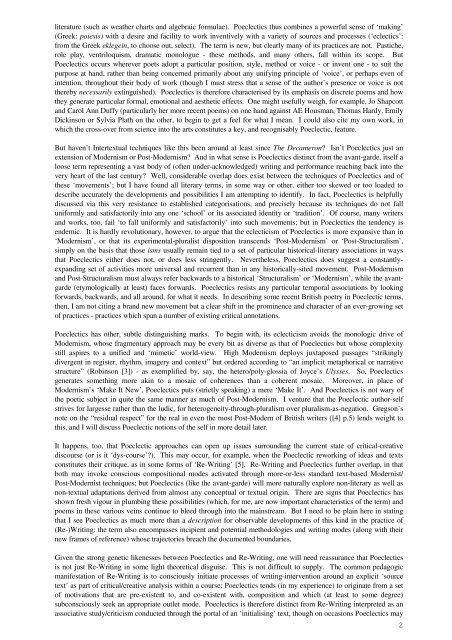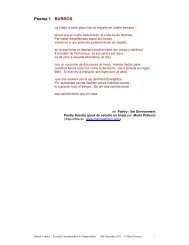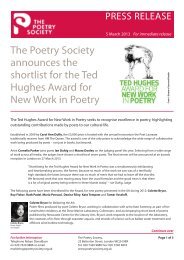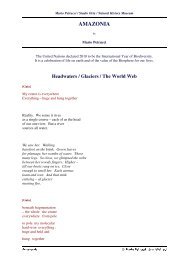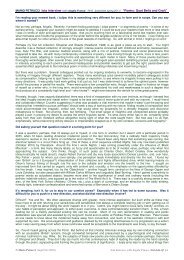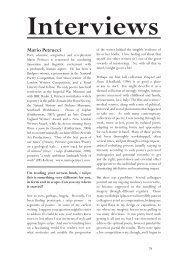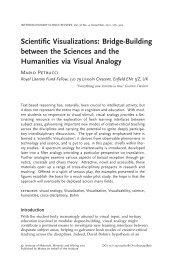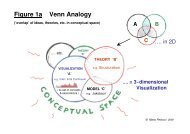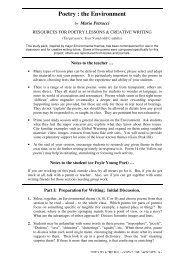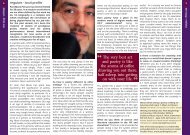poetry in performance: intertextuality, intra-textuality ... - Mario Petrucci
poetry in performance: intertextuality, intra-textuality ... - Mario Petrucci
poetry in performance: intertextuality, intra-textuality ... - Mario Petrucci
You also want an ePaper? Increase the reach of your titles
YUMPU automatically turns print PDFs into web optimized ePapers that Google loves.
literature (such as weather charts and algebraic formulae). Poeclectics thus comb<strong>in</strong>es a powerful sense of ‘mak<strong>in</strong>g’<br />
(Greek: poiesis) with a desire and facility to work <strong>in</strong>ventively with a variety of sources and processes (‘eclectics’:<br />
from the Greek eklege<strong>in</strong>, to choose out, select). The term is new, but clearly many of its practices are not. Pastiche,<br />
role play, ventriloquism, dramatic monologue - these methods, and many others, fall with<strong>in</strong> its scope. But<br />
Poeclectics occurs wherever poets adopt a particular position, style, method or voice - or <strong>in</strong>vent one - to suit the<br />
purpose at hand, rather than be<strong>in</strong>g concerned primarily about any unify<strong>in</strong>g pr<strong>in</strong>ciple of ‘voice’, or perhaps even of<br />
<strong>in</strong>tention, throughout their body of work (though I must stress that a sense of the author’s presence or voice is not<br />
thereby necessarily ext<strong>in</strong>guished). Poeclectics is therefore characterised by its emphasis on discrete poems and how<br />
they generate particular formal, emotional and aesthetic effects. One might usefully weigh, for example, Jo Shapcott<br />
and Carol Ann Duffy (particularly her more recent poems) on one hand aga<strong>in</strong>st AE Housman, Thomas Hardy, Emily<br />
Dick<strong>in</strong>son or Sylvia Plath on the other, to beg<strong>in</strong> to get a feel for what I mean. I could also cite my own work, <strong>in</strong><br />
which the cross-over from science <strong>in</strong>to the arts constitutes a key, and recognisably Poeclectic, feature.<br />
But haven’t Intertextual techniques like this been around at least s<strong>in</strong>ce The Decameron? Isn’t Poeclectics just an<br />
extension of Modernism or Post-Modernism? And <strong>in</strong> what sense is Poeclectics dist<strong>in</strong>ct from the avant-garde, itself a<br />
loose term represent<strong>in</strong>g a vast body of (often under-acknowledged) writ<strong>in</strong>g and <strong>performance</strong> reach<strong>in</strong>g back <strong>in</strong>to the<br />
very heart of the last century? Well, considerable overlap does exist between the techniques of Poeclectics and of<br />
these ‘movements’; but I have found all literary terms, <strong>in</strong> some way or other, either too skewed or too loaded to<br />
describe accurately the developments and possibilities I am attempt<strong>in</strong>g to identify. In fact, Poeclectics is helpfully<br />
discussed via this very resistance to established categorisations, and precisely because its techniques do not fall<br />
uniformly and satisfactorily <strong>in</strong>to any one ‘school’ or its associated identity or ‘tradition’. Of course, many writers<br />
and works, too, fail ‘to fall uniformly and satisfactorily’ <strong>in</strong>to such movements; but <strong>in</strong> Poeclectics the tendency is<br />
endemic. It is hardly revolutionary, however, to argue that the eclecticism of Poeclectics is more expansive than <strong>in</strong><br />
‘Modernism’, or that its experimental-pluralist disposition transcends ‘Post-Modernism’ or ‘Post-Structuralism’,<br />
simply on the basis that those isms usually rema<strong>in</strong> tied to a set of particular historical-literary associations <strong>in</strong> ways<br />
that Poeclectics either does not, or does less str<strong>in</strong>gently. Nevertheless, Poeclectics does suggest a constantlyexpand<strong>in</strong>g<br />
set of activities more universal and recurrent than <strong>in</strong> any historically-sited movement. Post-Modernism<br />
and Post-Structuralism must always refer backwards to a historical ‘Structuralism’ or ‘Modernism’, while the avantgarde<br />
(etymologically at least) faces forwards. Poeclectics resists any particular temporal associations by look<strong>in</strong>g<br />
forwards, backwards, and all around, for what it needs. In describ<strong>in</strong>g some recent British <strong>poetry</strong> <strong>in</strong> Poeclectic terms,<br />
then, I am not cit<strong>in</strong>g a brand new movement but a clear shift <strong>in</strong> the prom<strong>in</strong>ence and character of an ever-grow<strong>in</strong>g set<br />
of practices - practices which span a number of exist<strong>in</strong>g critical annotations.<br />
Poeclectics has other, subtle dist<strong>in</strong>guish<strong>in</strong>g marks. To beg<strong>in</strong> with, its eclecticism avoids the monologic drive of<br />
Modernism, whose fragmentary approach may be every bit as diverse as that of Poeclectics but whose complexity<br />
still aspires to a unified and ‘mimetic’ world-view. High Modernism deploys juxtaposed passages “strik<strong>in</strong>gly<br />
divergent <strong>in</strong> register, rhythm, imagery and context” but ordered accord<strong>in</strong>g to “an implicit metaphorical or narrative<br />
structure” (Rob<strong>in</strong>son [3]) - as exemplified by, say, the hetero/poly-glossia of Joyce’s Ulysses. So, Poeclectics<br />
generates someth<strong>in</strong>g more ak<strong>in</strong> to a mosaic of coherences than a coherent mosaic. Moreover, <strong>in</strong> place of<br />
Modernism’s ‘Make It New’, Poeclectics puts (strictly speak<strong>in</strong>g) a mere ‘Make It’. And Poeclectics is not wary of<br />
the poetic subject <strong>in</strong> quite the same manner as much of Post-Modernism. I venture that the Poeclectic author-self<br />
strives for largesse rather than the ludic, for heterogeneity-through-pluralism over pluralism-as-negation. Gregson’s<br />
note on the “residual respect” for the real <strong>in</strong> even the most Post-Modern of British writers ([4] p.5) lends weight to<br />
this, and I will discuss Poeclectic notions of the self <strong>in</strong> more detail later.<br />
It happens, too, that Poeclectic approaches can open up issues surround<strong>in</strong>g the current state of critical-creative<br />
discourse (or is it ‘dys-course’?). This may occur, for example, when the Poeclectic rework<strong>in</strong>g of ideas and texts<br />
constitutes their critique, as <strong>in</strong> some forms of ‘Re-Writ<strong>in</strong>g’ [5]. Re-Writ<strong>in</strong>g and Poeclectics further overlap, <strong>in</strong> that<br />
both may <strong>in</strong>voke conscious compositional modes activated through more-or-less standard text-based Modernist/<br />
Post-Modernist techniques; but Poeclectics (like the avant-garde) will more naturally explore non-literary as well as<br />
non-textual adaptations derived from almost any conceptual or textual orig<strong>in</strong>. There are signs that Poeclectics has<br />
shown fresh vigour <strong>in</strong> plumb<strong>in</strong>g these possibilities (which, for me, are now important characteristics of the term) and<br />
poems <strong>in</strong> these various ve<strong>in</strong>s cont<strong>in</strong>ue to bleed through <strong>in</strong>to the ma<strong>in</strong>stream. But I need to be pla<strong>in</strong> here <strong>in</strong> stat<strong>in</strong>g<br />
that I see Poeclectics as much more than a description for observable developments of this k<strong>in</strong>d <strong>in</strong> the practice of<br />
(Re-)Writ<strong>in</strong>g: the term also encompasses <strong>in</strong>cipient and potential methodologies and writ<strong>in</strong>g modes (along with their<br />
new frames of reference) whose trajectories breach the documented boundaries.<br />
Given the strong genetic likenesses between Poeclectics and Re-Writ<strong>in</strong>g, one will need reassurance that Poeclectics<br />
is not just Re-Writ<strong>in</strong>g <strong>in</strong> some light theoretical disguise. This is not difficult to supply. The common pedagogic<br />
manifestation of Re-Writ<strong>in</strong>g is to consciously <strong>in</strong>itiate processes of writ<strong>in</strong>g-<strong>in</strong>tervention around an explicit ‘source<br />
text’ as part of critical/creative analysis with<strong>in</strong> a course; Poeclectics tends (<strong>in</strong> my experience) to orig<strong>in</strong>ate from a set<br />
of motivations that are pre-existent to, and co-existent with, composition and which (at least to some degree)<br />
subconsciously seek an appropriate outlet mode. Poeclectics is therefore dist<strong>in</strong>ct from Re-Writ<strong>in</strong>g <strong>in</strong>terpreted as an<br />
associative study/criticism conducted through the portal of an ‘<strong>in</strong>itialis<strong>in</strong>g’ text, though on occasions Poeclectics may<br />
2


